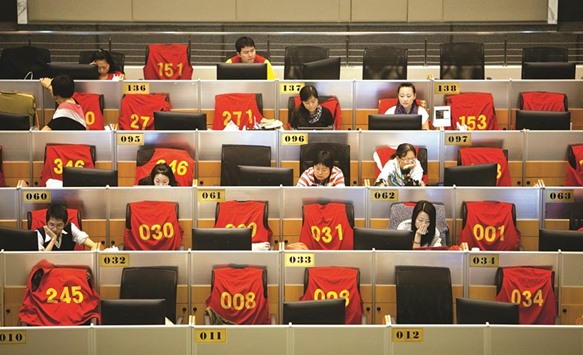China’s futures exchange is planning to relax the restrictions on stock-index contracts that sparked a 99% plunge in trading and heightened concern over the government’s intervention in markets, according to people familiar with the matter.
The bourse is considering allowing non-hedging accounts to open 100 new positions a day on a single contract, the people said. Currently, anything over 10 is labelled “abnormal trading.” It’s also considering lower margin requirements and smaller fees on same-day transactions, the people said. The proposals have yet to be finalised and any new rules would require approval from the China Securities Regulatory Commission.
The plan, which comes almost a year after China’s $5tn equity crash prompted a controversial government crackdown, suggests authorities are growing more confident that shares have stabilised.
Policy makers are trying to find the right balance between their desire for control and President Xi Jinping’s pledge three years ago to give markets a central role in Asia’s largest economy.
“They wouldn’t be doing this if they were expecting things to potentially get worse,” Kay Van-Petersen, a strategist at Saxo Capital Markets in Singapore, said by phone. “It’s a good move from a big-picture, structural perspective.”
Some traders have blamed thin volumes for exacerbating price moves in the index futures market, including a 10% flash crash in May. In that incident, contracts on the CSI 300 Index plunged by the daily limit before snapping back in less than a minute.
Brokerage-related stocks rose in yesterday afternoon trading on mainland markets, with China Cifco Investment surging by the 10% daily limit and Jiangsu Holly Corp, which holds a stake in Holly Futures, climbing 5.2%.
Calls to a China Financial Futures Exchange spokesman weren’t answered.
The CSRC didn’t immediately reply to a faxed request for comment.
Among the proposals said to be under consideration are lower the 40% margin requirement for non-hedging trades to 30%, and the 20% requirement for hedging accounts to 10%; reduce fees for closing positions that were opened on the same day, and minimum price movement for certain contracts may widen from the current 0.2% of contract value.
Traders in Shanghai have said an increase in the minimum price movement would help stabilise the market because it would increase the number of orders at each price level. That would make it less likely that a single order could rock the market, as happened on May 31. Under narrow price increments, known as tick sizes, investors are reluctant to reveal their orders in advance because others can jump ahead of them by increasing the price by a small fraction.
China’s stock-index futures market, the most active in the world before last year’s crackdown, was targeted by regulators in part because selling the contracts is one of the easiest ways for investors to make large wagers against stocks.
It’s also a favoured product for short-term speculators because the exchange allows participants to buy and sell the same contract in a single day. In the cash equities market, there’s a ban on same- day trading.
Yet futures are also a popular tool among sophisticated investors with longer-term horizons. For hedge funds, they provide an easy way to adjust exposure to market swings.
And large institutions use them to make cost-effective asset- allocation changes.
“Trading volume died, and without index futures it is difficult to hedge,” said Hao Hong, chief China strategist at Bocom International Holdings Co in Hong Kong. “Many strategies that previously worked have stopped.”
The Shanghai Composite Index, which plunged more than 48% from its June 2015 high through this year’s low in January, has since gained about 12%. Volatility in the benchmark equity gauge is less than a quarter of what it was during the crash last year.
“The relaxation, if it comes true, will no doubt spur trading,” said Ken Chen, a Shanghai-based stock analyst at KGI Securities. “Overall liquidity in the economy is high and investors have the need to hedge cash equity positions.”

Traders work at the Shanghai Futures Exchange. China’s stock index futures market, the most active in the world before last year’s crackdown, was targeted by regulators in part because selling the contracts is one of the easiest ways for investors to make large wagers against stocks.
